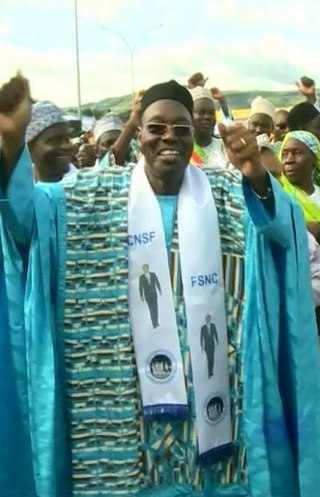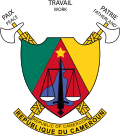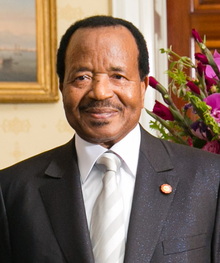
Cameroon, officially the Republic of Cameroon, is a country in Central Africa. It shares boundaries with Nigeria to the west and north, Chad to the northeast, the Central African Republic to the east, and Equatorial Guinea, Gabon, and the Republic of the Congo to the south. Its coastline lies on the Bight of Biafra, part of the Gulf of Guinea, and the Atlantic Ocean. Due to its strategic position at the crossroads between West Africa and Central Africa, it has been categorized as being in both camps. Cameroon's population of nearly 31 million people speak 250 native languages, in addition to the national tongues of English and French, or both. Early inhabitants of the territory included the Sao civilisation around Lake Chad and the Baka hunter-gatherers in the southeastern rainforest. Portuguese explorers reached the coast in the 15th century and named the area Rio dos Camarões, which became Cameroon in English. Fulani soldiers founded the Adamawa Emirate in the north in the 19th century, and various ethnic groups of the west and northwest established powerful chiefdoms and fondoms.
At the crossroads of West Africa and Central Africa, the territory of what is now Cameroon has seen human habitation since some time in the Middle Paleolithic, likely no later than 130,000 years ago. The earliest discovered archaeological evidence of humans dates from around 30,000 years ago at Shum Laka. The Bamenda highlands in western Cameroon near the border with Nigeria are the most likely origin for the Bantu peoples, whose language and culture came to dominate most of central and southern Africa between 1000 BCE and 1000 CE.

The politics of Cameroon takes place in the context of an electoral autocracy where multi-party elections have been held since 1992, the ruling party wins every election, and Paul Biya has been president since 1982. Since Cameroon's independence in 1960, it has been a single-party state and ruled only by two presidents: Ahmadou Ahidjo and Paul Biya. Political opposition are repressed and elections are manipulated in favor of the ruling party.

Paul Barthélemy Biya'a bi Mvondo is a Cameroonian politician who is the second president of Cameroon since 1982, having previously been the fifth prime minister from 1975 to 1982. As of 2025, he is the second-longest-ruling president in Africa and the longest consecutively serving current non-royal national leader in the world and the oldest head of state in the world.

The Cameroon People's Democratic Movement is the ruling political party in Cameroon. Previously known as the Cameroonian National Union, which had dominated Cameroon politics since independence in the 1960s, it was renamed in 1985. The national president of the CPDM is Paul Biya, the president of Cameroon, while the secretary-general of the party's Central Committee is Jean Nkuete.

Ahmadou Babatoura Ahidjo was a Cameroonian politician who was the first president of Cameroon from 1960 until 1982. He was previously the first prime minister of Cameroon from the country's independence in January 1960 until May of that same year following the creation of the presidency.

Under the current Constitution of Cameroon, the prime minister of Cameroon is a relatively powerless position. While the prime minister is officially appointed to be the head of government, the president retains most of the executive power and can fire the prime minister at will.
Ferdinand Léopold Oyono was a diplomat, politician and author from Cameroon.

Elections in Cameroon occur in a system of electoral autocracy, as the ruling party manipulates elections and represses political opposition.
An attempted coup d'état occurred in Cameroon in 1984, when presidential palace guards unsuccessfully tried to overthrow President Paul Biya. The fighting that resulted began on April 6, 1984, and ended several days later. The coup attempt is widely viewed as one of the most crucial events in the history of Cameroon since independence in 1960.
Bello Bouba Maigari is a Cameroonian politician currently serving in Joseph Ngute's government. He was the 2nd Prime Minister of Cameroon from 6 November 1982 to 22 August 1983 and has been the National President of the National Union for Democracy and Progress (UNDP) since January 1992. Although he was a key opposition leader for much of the 1990s, he has participated in the government since December 1997; he was Minister of State for Industrial and Commercial Development from 1997 to 2004, Minister of State for Post and Telecommunications from 2004 to 2009, and Minister of State for Transport from 2009 to 2009. Since December 2011, he has been Minister of State for Tourism and Leisure.
Adamou Ndam Njoya was a Cameroonian politician, lawyer, author, and professor. He was Minister of National Education from 1977 to 1980, and the President of the Cameroon Democratic Union until his death on 7 March 2020. He was replaced by his wife Patricia Tomaïno Ndam Njoya as Mayor of Foumban, a position he held since 1996. From 1997 to 2007, he was a Deputy in the National Assembly. He unsuccessfully ran as a presidential candidate in the 1992, 2004, 2011 and 2018 elections.

The Constitution of Cameroon is the supreme law of the Republic of Cameroon. Adopted in 1972, it is Cameroon's third constitution. The document consists of a preamble and 13 Parts, each divided into Articles. The Constitution outlines the rights guaranteed to Cameroonian citizens, the symbols and official institutions of the country, the structure and functions of government, the procedure by which the Constitution may be amended, and the process by which the provisions of the Constitution are to be implemented.

Cavayé Yéguié Djibril is a Cameroonian politician who has been the President of the National Assembly of Cameroon since 1992. He is a leading member of the Cameroon People's Democratic Movement (CPDM).

Issa Tchiroma Bakary is a Cameroonian politician who served in the government of Cameroon as Minister of Transport from 1992 to 1996 and has been Minister of Communication since 2009. He is the President of the Front for the National Salvation of Cameroon, a minor political party.
Maikano Abdoulaye was a Cameroonian politician. A veterinarian by profession, he held various positions in the government of Cameroon from 1970 to 1983, ultimately serving as Minister of State for the Armed Forces. Later, he was the Government Delegate to the Urban Commune of Garoua from 1996 to 2009, and in 2009 he was appointed as Roving Ambassador.
Adolphe Moudiki is a Cameroonian political figure who has been Director-General of the National Hydrocarbons Company, the state oil company of Cameroon, since 1993. A long-time associate of President Paul Biya, Moudiki was Minister of Labor from 1987 to 1988, Director of the Civil Cabinet of the Presidency from 1988 to 1989, and Minister of Justice from 1989 to 1991.

Presidential elections were held in Cameroon on 9 October 2011. Incumbent President Paul Biya stood for another term after a constitutional amendment passed in 2008 eliminated term limits. Biya was re-elected with 78% of the vote.

Presidential elections were held in Cameroon on 7 October 2018.













